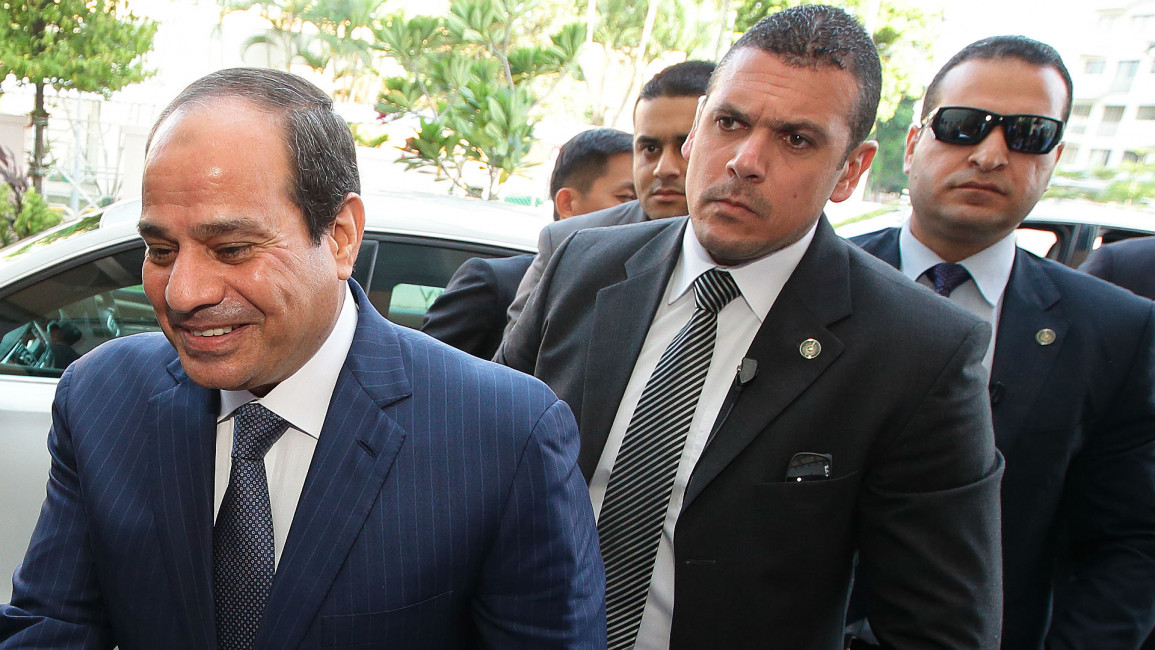Egyptian President Sisi 'strategic treasure' to Israel
Egyptian President Sisi 'strategic treasure' to Israel
Egyptian President Sisi is a "strategic treasure" for Israel and its relations with the general-turned-president are more important than restore diplomatic relations with Turkey, a veteran Israeli columnist has said.
3 min read
Israel's "strategic treasure", according to Melman [Getty]
One of Israel's leading journalists and national security analysts has said Egyptian President Abdel Fattah al-Sisi is a "strategic treasure" for Israel.
Security and intelligence affairs commentator for the Israeli daily Maariv, Yossi Melman, wrote on Sunday that despite Sisi being an important asset he also posed an obstacle to normalising relations with Turkey and ending the siege of the Hamas-ruled Gaza Strip.
The well-connected commentator also revealed that CIA director John Brennan agreed last month during an unannounced visit to Cairo that the US would provide the Egyptian army with military aid to help quell an Islamic insurgency in the Sinai Peninsula, which borders Israel and Gaza.
Egypt has already received military aid in the form of satellite imagery, anti-missile interceptors and communications intelligence from Israel to fight the Islamic state [IS] group-affiliated militants in Sinai, according to Melman.
He said that the chief of the Israeli Security Agency Yoram Cohen is a "familiar figure" among the Egyptian intelligence officials and has frequently visited Egypt, including during the Israeli aggression against Gaza in 2014 to discuss the ongoing war and Hamas.
Melman said that lifting the siege or the "sense of siege" from Gaza was in the best interests of Israel, but that Egypt was standing in the way because of its stance towards the Islamic Hamas movement.
The Egyptian media has blamed Hamas, an ideological offshoot of the Muslim Brotherhood, for having connections to a series of deadly attacks on security forces in Sinai.
"Gazans currently receive the majority of their supply of goods from Israel. Every day around 800 lorries go into Gaza through Israeli crossings. The Rafah border crossing with Egypt is closed most of the year. Therefore, it is actually Egypt imposing the siege on Gaza not Israel," Melman argued.
He also said that Israel's close relations with the Sisi government have placed it in an awkward position with Turkey.
"Israel has found itself caught between a desire to improve relations with Turkey and the important strategic relationship with Sisi. At this point, the Egyptian relationship more important for Israel," he said.
Diplomatic ties between Turkey and Egypt were severed after Sisi, the then head of the military, led a coup against former Islamist president Mohammad Morsi in 2013.
Since then, Turkish President Recep Tayyip Erdogan, who is closely aligned with Morsi's Muslim Brotherhood, has refused to establish diplomatic ties with Sisi.
Last month, Turkey demanded that Israel permit unfettered access to the Gaza Strip as one of the conditions before it renews diplomatic ties with Israel.
Erdogan has consistently put forward three demands for a normalisation of ties: an Israeli apology for the 2010 Gaza flotilla raid; a compensation package for the families of those killed on the ship; and a lifting of the blockade of Gaza.
Security and intelligence affairs commentator for the Israeli daily Maariv, Yossi Melman, wrote on Sunday that despite Sisi being an important asset he also posed an obstacle to normalising relations with Turkey and ending the siege of the Hamas-ruled Gaza Strip.
The well-connected commentator also revealed that CIA director John Brennan agreed last month during an unannounced visit to Cairo that the US would provide the Egyptian army with military aid to help quell an Islamic insurgency in the Sinai Peninsula, which borders Israel and Gaza.
Egypt has already received military aid in the form of satellite imagery, anti-missile interceptors and communications intelligence from Israel to fight the Islamic state [IS] group-affiliated militants in Sinai, according to Melman.
He said that the chief of the Israeli Security Agency Yoram Cohen is a "familiar figure" among the Egyptian intelligence officials and has frequently visited Egypt, including during the Israeli aggression against Gaza in 2014 to discuss the ongoing war and Hamas.
 |
It is actually Egypt imposing the siege on Gaza not Israel - Maariv columnist, Yossi Melman. |  |
Melman said that lifting the siege or the "sense of siege" from Gaza was in the best interests of Israel, but that Egypt was standing in the way because of its stance towards the Islamic Hamas movement.
The Egyptian media has blamed Hamas, an ideological offshoot of the Muslim Brotherhood, for having connections to a series of deadly attacks on security forces in Sinai.
"Gazans currently receive the majority of their supply of goods from Israel. Every day around 800 lorries go into Gaza through Israeli crossings. The Rafah border crossing with Egypt is closed most of the year. Therefore, it is actually Egypt imposing the siege on Gaza not Israel," Melman argued.
He also said that Israel's close relations with the Sisi government have placed it in an awkward position with Turkey.
"Israel has found itself caught between a desire to improve relations with Turkey and the important strategic relationship with Sisi. At this point, the Egyptian relationship more important for Israel," he said.
Diplomatic ties between Turkey and Egypt were severed after Sisi, the then head of the military, led a coup against former Islamist president Mohammad Morsi in 2013.
Since then, Turkish President Recep Tayyip Erdogan, who is closely aligned with Morsi's Muslim Brotherhood, has refused to establish diplomatic ties with Sisi.
Last month, Turkey demanded that Israel permit unfettered access to the Gaza Strip as one of the conditions before it renews diplomatic ties with Israel.
Erdogan has consistently put forward three demands for a normalisation of ties: an Israeli apology for the 2010 Gaza flotilla raid; a compensation package for the families of those killed on the ship; and a lifting of the blockade of Gaza.



